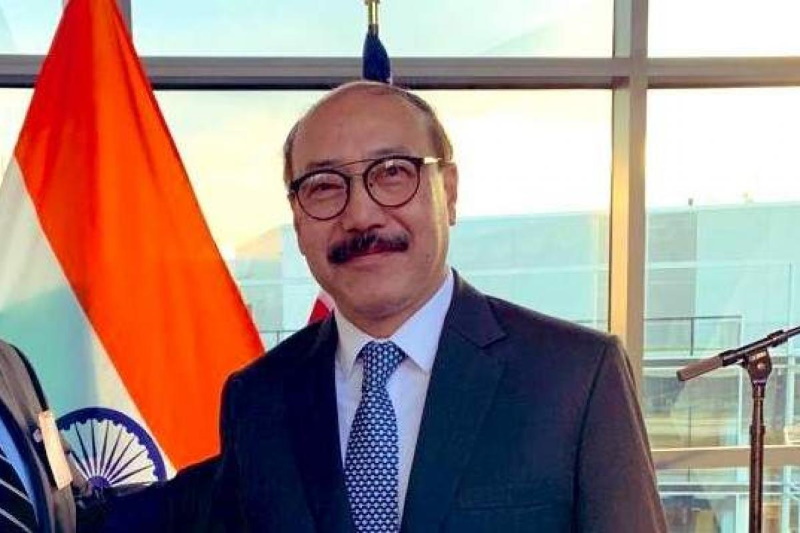 New Delhi:”Bangladesh is historically an important trading and transport hub for our subcontinent,” said Harsh V Shringla, India’s foreign secretary. “India and Bangladesh” signed an agreement to transfer cargo to the northeastern part of India using the Chattogram and Mongla ports. Fully operationalizing this agreement will bring economic benefits to a range of stakeholders from both countries,” Shringla said during an interaction with the Bangladesh delegation at the 10th India-Bangladesh friendship dialogue.
New Delhi:”Bangladesh is historically an important trading and transport hub for our subcontinent,” said Harsh V Shringla, India’s foreign secretary. “India and Bangladesh” signed an agreement to transfer cargo to the northeastern part of India using the Chattogram and Mongla ports. Fully operationalizing this agreement will bring economic benefits to a range of stakeholders from both countries,” Shringla said during an interaction with the Bangladesh delegation at the 10th India-Bangladesh friendship dialogue.
While North East India will benefit from a steady supply of goods, the transport and logistics sector in Bangladesh will gain considerably, bringing prosperity on both sides of the border, he added. The Foreign Secretary said that as today, Bangladesh is commemorating Language Day adding that 70 years ago on this day-February 21-, the youth of the then East Pakistan made supreme sacrifices for the recognition and respect for their mother language. “Now, the whole world celebrates this day as International Mother Language Day. I pay my tributes to the language heroes who laid down their lives for a very noble cause”, he said.
He thanked Bangladesh for its valuable support and encouragement in being able to achieve some remarkable feats together in recent years. External Affairs Minister Dr. S Jaishankar also paid a visit to Dhaka last year. Shringla recalled that these high-level engagements are reflective of the priority that both countries attach to this relationship. More importantly, they reflect the trust and confidence that both countries have in each other.
“Today, as Bangladesh commemorates fifty years of its independence, I am happy to note that its growth has proven its detractors wrong. Bangladesh has emerged as a role model for strong socio-economic growth”, he reiterated. “The growth of Bangladesh is not just in the interest of the people of Bangladesh, but equally, in the interest of the region and beyond. It is this spirit of interdependence and fraternal ties that drive our development cooperation with Bangladesh, which is the largest that we have with any country,” he added.
The Foreign Secretary talked about the effective management of the India-Bangladesh border is key to facilitating economic linkages and people-to-people contact. He pointed out that there is a need to work closely to strengthen border infrastructure to ensure smooth transit of goods and people while ensuring that illegal activities are kept under check. “An example of this approach is our objective of establishing additional border huts,” he added.
It is worth noting that two-way trade in the recent past has witnessed a quantum jump with exports from Bangladesh, for the first time, expected to cross $ 2 billion this year. The early conclusion of a Comprehensive Economic Cooperation Agreement is vital in enhancing this momentum in trade. “Another area that needs concerted focus is connectivity. We have made some progress here but there is a need to make more effective and sustained efforts,” Shringla underlined.
Outlining the remarkable progress in enhancing connectivity, Shringla said more effective and sustained efforts are needed. “In a significant development, on February 5, 2022, a cargo vessel carrying food grains sailed from Patna (Bihar) and will travel via the waterways of India and Bangladesh to reach Pandu (Assam) in early March”, he added.
Also read: No unease in India-Bangladesh ties, says Foreign Secretary ShringlaHe highlighted India’s ‘Gati Shakti’ initiative which is upgrading connectivity in India with a multi-modal perspective. “The movement of products from locations of production to places of value addition and consumption needs multiple modes of transportation. Our bilateral arrangements should reflect this paradigm to maintain the competitive advantage that our geographical proximity offers us”, added Shringla.
India and Bangladesh share 54 rivers which are part of our shared resources and responsibilities. The historic accord on Ganga water sharing has stood the test of time. Shringla informed that both the countries are now working on finalizing agreements for other rivers and exchanging best practices in the areas of river embankments, addressing the salinity of rivers, etc.
As the impact of climate change is felt in both countries, more comprehensive cooperation in water conservation, fisheries, flood management, and pollution in rivers is required, he said while adding that greater synergies in climate action, preserving shared natural heritage such as Sundarbans, etc. are also required. He reiterated that India remains committed to building the momentum of regional cooperation under the BIMSTEC Framework.
“It is an important vehicle for enhancing economic cooperation, development and connectivity in the region. We look forward to the next BIMSTEC Summit,” Shringla said. He stressed the need to nurture and uphold the spirit of the 1971 Liberation War, especially at a time when anti-liberation forces were trying to destabilize our territory for their own interests.





